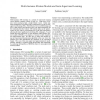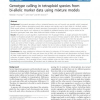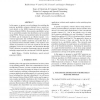135
click to vote
ACL
2012
13 years 4 months ago
2012
Statistical machine translation is often faced with the problem of combining training data from many diverse sources into a single translation model which then has to translate se...
153
Voted
SDM
2011
SIAM
14 years 4 months ago
2011
SIAM
Multi-instance (MI) learning is a variant of supervised learning where labeled examples consist of bags (i.e. multi-sets) of feature vectors instead of just a single feature vecto...
133
click to vote
IR
2011
14 years 5 months ago
2011
We review the history of modeling score distributions, focusing on the mixture of normal-exponential by investigating the theoretical as well as the empirical evidence supporting i...
124
click to vote
BMCBI
2011
14 years 5 months ago
2011
Background: Automated genotype calling in tetraploid species was until recently not possible, which hampered genetic analysis. Modern genotyping assays often produce two signals, ...
100
click to vote
ICASSP
2011
IEEE
14 years 5 months ago
2011
IEEE
Simplification of mixture models has recently emerged as an important issue in the field of statistical learning. The heavy computational demands of using large order models dro...
118
click to vote
ICASSP
2011
IEEE
14 years 5 months ago
2011
IEEE
In this paper, we present a novel technique for modeling the posterior probability estimates obtained from a neural network directly in the HMM framework using the Dirichlet Mixtu...
151
click to vote
TNN
2010
14 years 8 months ago
2010
Finite mixture model is a powerful tool in many statistical learning problems. In this paper, we propose a general, structure-preserving approach to reduce its model complexity, w...
138
click to vote
TMI
2010
14 years 8 months ago
2010
Within-subject analysis in fMRI essentially addresses two problems, the detection of brain regions eliciting evoked activity and the estimation of the underlying dynamics. In [1, 2...
137
click to vote
SAC
2011
ACM
14 years 9 months ago
2011
ACM
We propose a more efficient version of the slice sampler for Dirichlet process mixture models described by Walker (2007). This sampler allows the fitting of infinite mixture mod...
184
click to vote
Presentation
Presentation of the exponential families, of the mixtures of such distributions and how to learn it. We then present algorithms to simplify mixture model, using Kullback-Leibler di...



